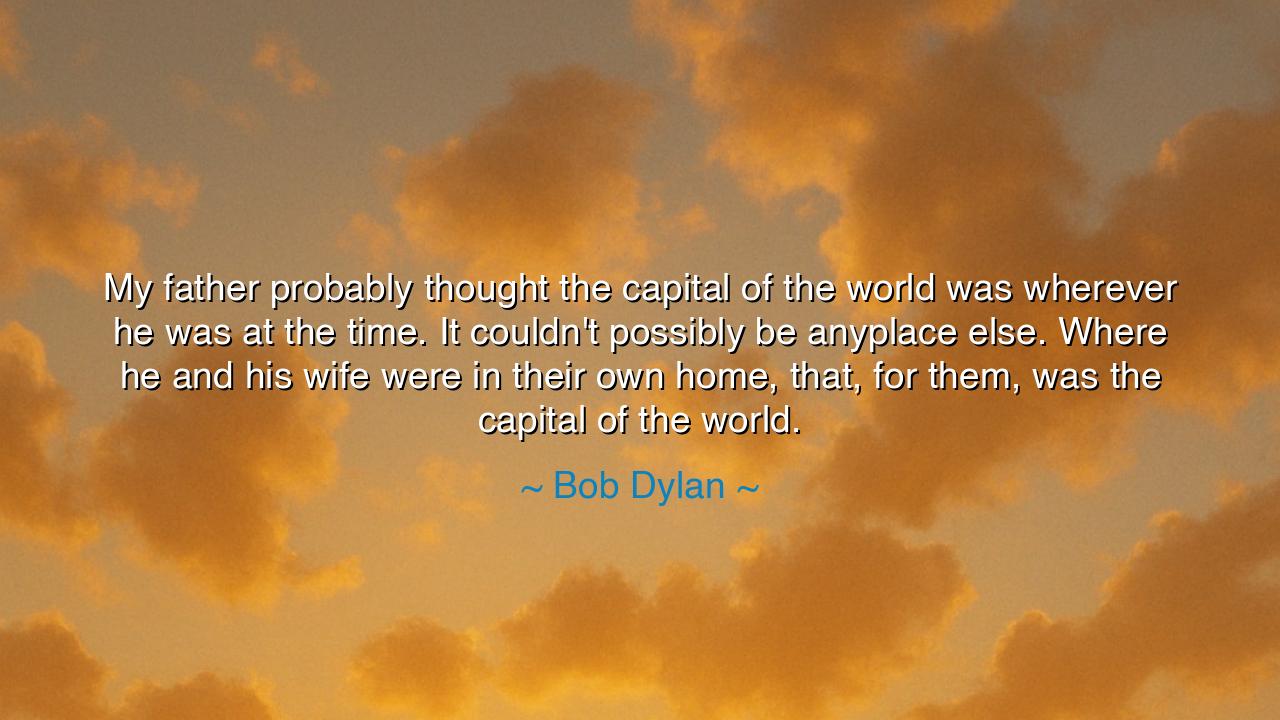
My father probably thought the capital of the world was wherever
My father probably thought the capital of the world was wherever he was at the time. It couldn't possibly be anyplace else. Where he and his wife were in their own home, that, for them, was the capital of the world.






“My father probably thought the capital of the world was wherever he was at the time. It couldn’t possibly be anyplace else. Where he and his wife were in their own home, that, for them, was the capital of the world.” Thus spoke Bob Dylan, the poet of wandering roads and restless hearts. Yet in this reflection, he does not sing of movement, but of belonging. His words are not about ambition, or cities, or maps—they are about the sacred center of human life: home, and the quiet majesty of those who carry contentment within themselves. In describing his father, Dylan paints the portrait of a man who did not need the world’s applause to feel its worth, for he already possessed the kingdom of peace that lies in the heart of the simple and the grounded.
In this saying, Dylan gives voice to a truth older than time: that the capital of the world is not found in the halls of power or in cities of stone, but wherever love, loyalty, and gratitude dwell. His father, by his account, was not a man who sought the world’s center—he carried it with him. Wherever he was, there was meaning; wherever his wife was, there was wholeness. To such souls, the measure of greatness is not distance traveled, but presence, not status, but sufficiency. The capital of the world, for them, was not Paris or New York, but the dinner table, the hearth, the laughter shared in the fading light of evening.
The ancients, too, spoke of such wisdom. The Roman philosopher Seneca wrote, “The wise man lives as if he were the ruler of the world, though he possesses nothing.” What he meant was not pride, but serenity: that the man who finds peace within his small domain has mastered the art of kingship. Dylan’s father embodies this very stoicism—a ruler not of nations, but of the household; not of people, but of spirit. To see one’s own life as the center of the world is not arrogance when it springs from contentment. It is the recognition that the world’s meaning is not something external, to be conquered or won, but something internal, to be cherished and tended.
Consider the story of Cincinnatus, the Roman farmer who was called from his plow to lead Rome in its time of crisis. He saved the Republic, and when victory was won, he refused power and returned to his field. The world offered him crowns and titles, but his capital was his own land, his family, his peace. In that humble field lay his universe. So it was, perhaps, with Dylan’s father: his greatness did not need monuments or headlines, for he ruled the only empire that truly endures—the realm of the heart.
Dylan, born into a century of movement—of trains and highways, of revolutions and fame—knew what it meant to wander. Yet even as his music carried him to the farthest corners of the earth, he saw in his father something eternal and unchanging: the power of rootedness. The elder Dylan did not seek meaning in the world; he created it, wherever he stood. He and his wife did not wait for the world to give them importance; they declared their home sacred. There is profound heroism in that simplicity, for in an age that chases recognition, to be content is the rarest victory of all.
When Dylan says, “It couldn’t possibly be anyplace else,” he reveals both affection and admiration. His father’s confidence was not born of pride, but of presence—the kind of peace that says, I am here, and here is enough. It is the peace of the craftsman who takes joy in his labor, of the mother who delights in her children, of the man who looks upon his life and calls it whole. This, perhaps, is the truest wisdom a generation can pass down: that the measure of greatness is not where one stands in the eyes of the world, but what one stands for in the quiet corners of daily life.
So, my listener, learn this lesson and carry it as a lantern for your own path: the capital of your world is not somewhere else—it is where you are, when you are present, grateful, and loving. You need not chase the centers of power or the lights of distant cities to find meaning. Build your own center; make of your home a kingdom of peace. Whether your dwelling is grand or humble, whether the world knows your name or not, let your love make it the heart of creation itself. For the wise know, as Bob Dylan’s father knew, that the world is not measured in miles or monuments, but in the warmth of those who make it home.
And when you, too, can say, “Where I am is the capital of the world,” not out of vanity, but out of joy and gratitude, then you will have found what all travelers, kings, and dreamers have sought through the ages: the still point at the center of life—the home within the heart.






AAdministratorAdministrator
Welcome, honored guests. Please leave a comment, we will respond soon